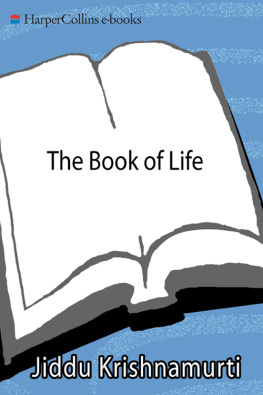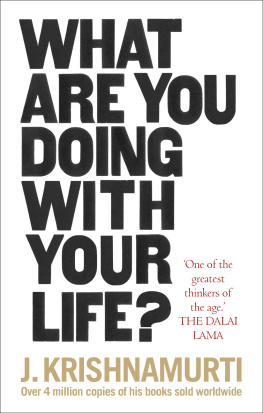Krishnamurti - The Transformation of Man: The Wholeness of Life
Here you can read online Krishnamurti - The Transformation of Man: The Wholeness of Life full text of the book (entire story) in english for free. Download pdf and epub, get meaning, cover and reviews about this ebook. publisher: Krishnamurti Foundation Trust, genre: Religion. Description of the work, (preface) as well as reviews are available. Best literature library LitArk.com created for fans of good reading and offers a wide selection of genres:
Romance novel
Science fiction
Adventure
Detective
Science
History
Home and family
Prose
Art
Politics
Computer
Non-fiction
Religion
Business
Children
Humor
Choose a favorite category and find really read worthwhile books. Enjoy immersion in the world of imagination, feel the emotions of the characters or learn something new for yourself, make an fascinating discovery.

- Book:The Transformation of Man: The Wholeness of Life
- Author:
- Publisher:Krishnamurti Foundation Trust
- Genre:
- Rating:4 / 5
- Favourites:Add to favourites
- Your mark:
- 80
- 1
- 2
- 3
- 4
- 5
The Transformation of Man: The Wholeness of Life: summary, description and annotation
We offer to read an annotation, description, summary or preface (depends on what the author of the book "The Transformation of Man: The Wholeness of Life" wrote himself). If you haven't found the necessary information about the book — write in the comments, we will try to find it.
The Transformation of Man: The Wholeness of Life — read online for free the complete book (whole text) full work
Below is the text of the book, divided by pages. System saving the place of the last page read, allows you to conveniently read the book "The Transformation of Man: The Wholeness of Life" online for free, without having to search again every time where you left off. Put a bookmark, and you can go to the page where you finished reading at any time.
Font size:
Interval:
Bookmark:
The Transformation of Man: The Wholeness of Life
Copyright 1978 Krishnamurti Foundation Trust Ltd
THE TRANSFORMATION OF MAN
The Wholeness of Life
by J. Krishnamurti
CONTENTS
Abridged discussions between Krishnamurti, Professor David Bohm
and Dr David Shainberg
The substance of the public talks given in Ojai, California; Saanen, Switzerland;
and Brockwood Park, England, during 1977
Two Dialogues
Krishnamurti talks with a small group at Ojai drawn from the Krishnamurti
schools and Foundations in Canada, England, India and USA
PART I
SEVEN DIALOGUES
between Krishnamurti, Dr David Bohm, Professor of
Theoretical Physics at Birkbeck College, University of
London, and Dr David Shainberg, a Psychiatrist
of New York City
Abridged from videotape recordings
at Brockwood Park, Hampshire, in May 1976
DIALOGUE I
May 17
K RISHNAMURTI : Can we talk about the wholeness of life? Can one be aware of that wholeness if the mind is fragmented? You cant be aware of the whole if you are only looking through a small hole.
Dr Shainberg : Right. But on the other hand in actuality you are the whole.
K: Ah! That is theory.
S : Is it?
Dr Bohm : A supposition, of course it is.
K: Of course, when you are fragmented how can you assume that you are the whole?
S : How am I to know I am fragmented?
K: When there is conflict.
S : Thats right.
K: When opposing desires, opposing wishes, opposing thoughts bring conflict. Then you have pain, then you become conscious of your fragmentation.
S : Right. But at those moments it often happens that you dont want to let go of the conflict.
K: That is a different matter. What we are asking is: Can the fragment dissolve itself, for then only it is possible to see the whole.
S : All you really know is your fragmentation.
K: That is all we know.
B : That is right.
K: Therefore lets stick to that.
B : The supposition that there is a whole may be reasonable but as long as you are fragmented you could never see it. It would be just an assumption.
K: Of course, right.
S : Right.
B : You may think you have experienced it once, but that is also an assumption.
K: Absolutely. Quite right.
S : You know, I wonder if there is not a tremendous pain or something that goes on when I am aware of my fragmentationa loneliness somehow.
K: Look, sir: Can you be aware of your fragment? That you are an American, that I am a Hindu, Jew, Communist or whateveryou just live in that state. You dont say, Well I know I am a Hinduit is only when you are challenged, it is only when it is said, What are you? that you say, I am an Indian, or a Hindu, or an Arab.
B : When the country is challenged then you have got to worry.
K: Of course.
S : So you are saying that I am living totally reactively?
K: No, you are living totally in a kind of miasma, confusion.
S : From one piece to the next, from one reaction to the next reaction.
K: So can we be aware, actually, of the various fragments? That I am a Hindu, that I am a Jew, that I am an Arab, that I am a Communist, that I am a Catholic, that I am a businessman, that I am married, that I have responsibilities; I am an artist, I am a scientistyou follow? All this sociological fragmentation.
S : Right.
K: As well as psychological fragmentation.
S : Right right. That is exactly what I started with. This feeling that I am a fragment.
K: Which you call the individual.
S : That I call important, not just the individual.
K: You call that important.
S : Right. That I have to work.
K: Quite.
S : It is significant.
K: So can we now, in talking together, be aware that I am that? I am a fragment and therefore creating more fragments, more conflict, more misery, more confusion, more sorrow, because when there is conflict it affects everything.
S : Right.
K: Can you be aware of it as we are discussing?
S : I can be aware a little as we are discussing.
K: Not a little.
S : Thats the trouble. Why cant I be aware of it?
K: Look, sir. You are only aware of it when there is conflict. It is not a conflict in you now.
B : But is it possible to be aware of it without conflict?
K: That is the next thing, yes. That requires quite a different approach.
B : But I was thinking of looking at one pointthat the importance of these fragments is that when I identify myself and say I am this, I am that, I mean the whole of me. The whole of me is rich or poor, or American, or whatever, and therefore it seems all-important. I think the trouble is that the fragment claims it is the whole, and makes itself very important.
S : Takes up the whole life.
B : Then comes a contradiction, and then comes another fragment saying it is the whole.
K: You know this whole world is broken up that way, outside and inside.
S : Me and you.
K: Yes, me and you, we and they...
B : But if we say I am wholly this, then we also say I am wholly that.
S : This movement into fragmentation almost seems to be caused by something. It seems to be...
K: Is this what you are asking? What is the cause of this fragmentation?
S : Yes. What is the cause of the fragmentation? What breeds it? What sucks us into it?
K: We are asking something very important, which is: What is the cause of this fragmentation?
S : That is what I was getting into. There is some cause... I have got to hold on to something.
K: No. Just look at it, sir. Why are you fragmented?
S : Well, my immediate response is the need to hold on to something.
K: No, much deeper than that. Much deeper. Look at it. Look at it. Lets go slowly into it.
S : OK.
K: Not immediate responses. What brings this conflict which indicates I am fragmented, and then I ask the question: What brings this fragmentation? What is the cause of it?
B : Right. That is important.
K: Yes. Why are you and I and the majority of the world fragmented? What is the cause of it?
B : It seems we wont find the cause by going back in time to a certain...
S : I am not looking for genetics, I am looking for right this second...
K: Sir, just look at it. Put it on the table and look at it objectively. What brings about this fragmentation?
S : Fear.
K: No, no, much more.
B : Maybe the fragmentation causes fear.
K: Yes, thats it. Why am I a Hindu?if I am, I am not a Hindu, I am not an Indian, I have no nationality. But suppose I call myself a Hindu. What makes me a Hindu?
S : Well, conditioning makes you a Hindu.
K: What is the background, what is it that makes me say I am a Hindu? Which is a fragmentation, obviously.
S : Right, right.
K: What makes it? My father, my grandfathergenerations and generations before me, 10,000 or 5,000 years, they have been saying you are a Brahmin.
S : You dont say or write I am a Brahmin, you are a Brahmin. Right? That is quite different. You say I am a Brahmin because...
K: It is like you saying I am a Christian. Which is what?
S : Tradition, conditioning, sociology, history, culture, family, everything.
K: But behind that, what is behind that?
S : Behind that is mans...
K: No, no. Dont theorize. Look at it in yourself.
S : Well, it gives me a place, an identity; I know who I am then, I have my little niche.
Next pageFont size:
Interval:
Bookmark:
Similar books «The Transformation of Man: The Wholeness of Life»
Look at similar books to The Transformation of Man: The Wholeness of Life. We have selected literature similar in name and meaning in the hope of providing readers with more options to find new, interesting, not yet read works.
Discussion, reviews of the book The Transformation of Man: The Wholeness of Life and just readers' own opinions. Leave your comments, write what you think about the work, its meaning or the main characters. Specify what exactly you liked and what you didn't like, and why you think so.









